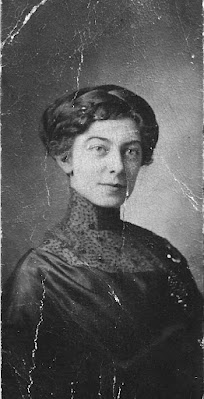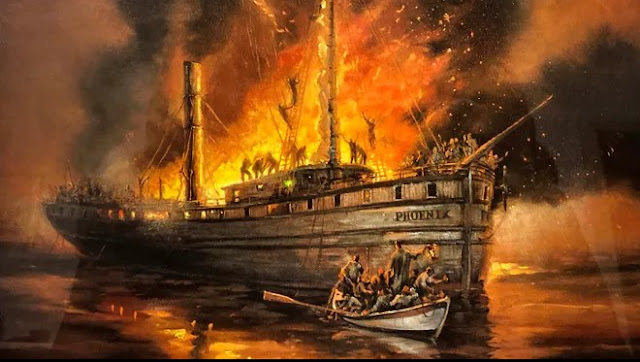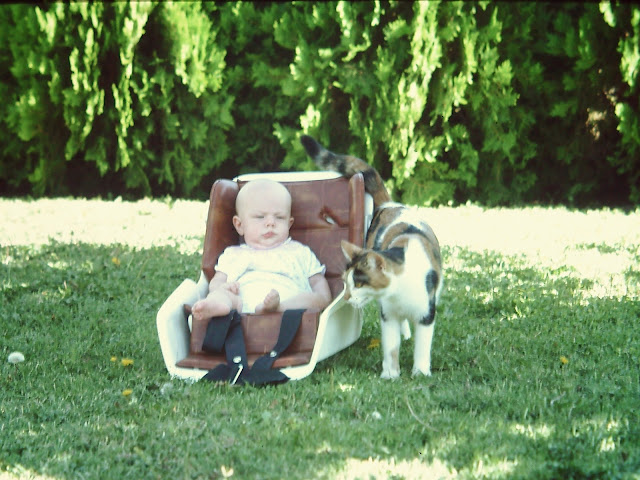"You ought to see it--it's right there on your way home. Just turn right, into Dakota City. Watch for the signs."
That I didn't know him doesn't mean I didn't recognize the guy. He's a Dakota County version of me--retired, a tad overweight and underserved by his hairdo. But the guy spills enthusiasm for ye olden days. "You can't miss it," he says as he rips through the pages of an old booklet to find a picture of the church he's looking for, then shoves the entire booklet in my hand--a Nebraska Centennial History of Dakota County, Nebraska, dated 1967. "Take it along," he says. It was right there on a table of the museum. There's still a pile. Not to worry.
If you got a minute, you can't say no to all that joy. Besides, he says it's not just any old church, but the very first Lutheran church in all of Nebraska, formed there two years before the War Between the States, way back in 1858, when a missionary named Kuhns crossed half the continent and the raging Missouri just to get here and preach the gospel to the pioneers, which he did, preached the very first Lutheran sermon in a long-gone Dakota City Hotel--get this, the Bates Hotel. The first meeting of Emanuel Lutheran was at the Bates Hotel. (I'm not making this up.)
There is some horror here in the story of the church behind the fence, but no murder, at least none written up in the Centennial booklet, which is itself fifty-plus years old. The horrors follow. Tired of the Bates Hotel, those goodly, godly Lutherans bought what was left of a store in a village wiped out when that rascal river flooded, but that skeletal building never made it to town. It went up in a prairie fire as it was being hauled to Dakota City.
Two years later, this very building--the oldest church structure in all of Nebraska--was built at a cost of $2000. That centennial book includes a story that somehow makes sense when you see the old church. The Reverend Kuhns and Emanuel Lutheran got themselves snowed in one Sunday, in the kind of brutal Nebraska blizzard old folks use to impress the kids. Just three men were there that day--that's it; just the pastor and a congregation of two. Reverend Kuhns shook off whatever reluctance or doubt he might have had and went on to deliver a Lutheran hum-dinger to the only two souls in the pews.
Even if there's no snow in the air, I'll swear that if, on some cloudy day you look through the spaces of that chain-link fence all around, you'll still hear that sermon echo through the place--in German, I'm sure--as if no time has passed, just the three of them there, sheltered in the time of storm.
It's a shame that fence has to be all around. You can't help but half-expect some "Beware of Dog" sign hammered in the grass. When I got out of the car, I couldn't help thinking Emanuel Lutheran was a prisoner. Once a year it opens, I hear. Otherwise, there it stands in a quiet neighborhood of Dakota City, where it's stood for a long, long time, all around it that fence. Fort Emanuel.
Why not bring it away somewhere and open up the property to new housing? Why keep it around if it's not going to serve the people it was meant to?-if it's a fenced-in prisoner of its own old age?
It's not nostalgia that keeps it there. Not the docent, not anybody in Dakota City, Nebraska, is old enough to remember attending regular worship in Emanuel Lutheran.
There it stands, well kept, but locked behind a fence so tall I'd need a ladder to get in. I had no need to get in. I didn't even want to, but it hurt to see that old frame church so imprisoned behind that chain link fence. Still, as I stood there, that wire fence somehow disappeared. Strange effect.
I couldn't help thinking we need our old Emanuel Lutherans. The sermons they preach, even behind fences, offer explanations of who we are and what we need to know about ourselves in whatever Dakota Cities we live and have our being.
"This old church still stands as a monument to the steadfastness of purpose of the early settlers," the Historical Marker says, "and as a symbol of pioneer religious life."
Here's what the fenced-in church still preaches: we are not alone. There were others, in 1860 and long before that, truth be told. We are not the first. We are not alone.
I sent my Dakota City doppelganger a note, thanked him for his help and the Centennial booklet, then let him know that, as instructed, I'd stopped at the church. "Quite the place," I said.




























